Tobacco company CEOs face lawmakers' questions on their role in youth vaping epidemic
The CEOs insisted their companies are "responsible actors" in the marketplace.
Executives from some of the largest e-cigarette companies defended their business practices on Capitol Hill on Wednesday, amid concerns about their role in the rising rates of nicotine addiction among young people.
Federal officials and lawmakers on both sides of the aisle have raised concerns about products such as Juul and other e-cigarette brands in recent years.
The tobacco CEOs delivered their opening statements before the House Energy and Commerce committee -- sitting in front of a dozen young anti-vaping advocates from Truth Initiative in bright orange shirts -- insisting their companies are "responsible actors" in the marketplace and do not market or sell to underage users.
"I fully recognize that the opportunity for the millions of adult smokers who still use combustible cigarettes to have an alternative is at risk if we don’t address this issue," K.C. Crosthwaite, Juul's CEO, said. "We are focused on combating underage access because I know it puts it all at risk if we don’t make progress here."
Chairman Frank Pallone, D-N.J., called it "chilling" to see the tactics and trends from the popularity of traditional cigarettes repeat itself with these new products.
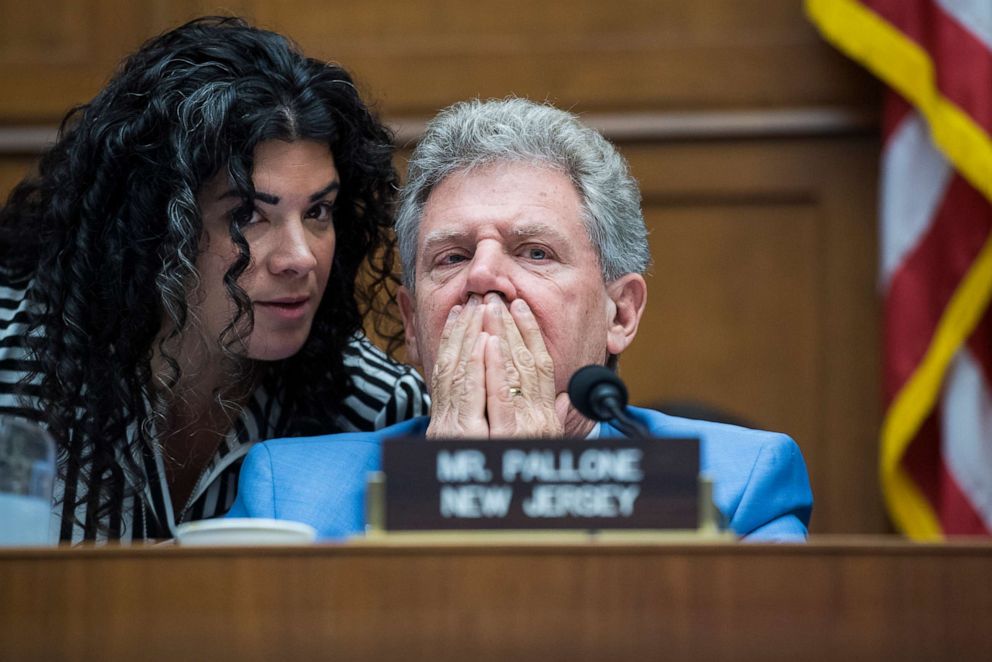
"I heard all of you over and over say you are responsible men, men of integrity. That is not true," Pallone said, adding he doesn't believe the executives when they say they don't intentionally target young people.
He continued, "If you want to be men of integrity, responsible men, you would not be selling this product."
Last year, the Trump administration announced a new policy aimed at reducing the number of young people using e-cigarettes by banning sweet and mint flavors for cartridge-based vaping products, but leaving menthol and tobacco flavors on the market.
The "flavor ban" goes into effect this week, but advocates say it contains major loopholes that leave other flavored products on the market, and that young people are already moving away from Juul to other nicotine products like Puff Bar -- a disposable, single-use e-cigarette.
In Wednesday's hearing, the company executives were pressed on the flavored nicotine products still on the market and the role they play in the epidemic.
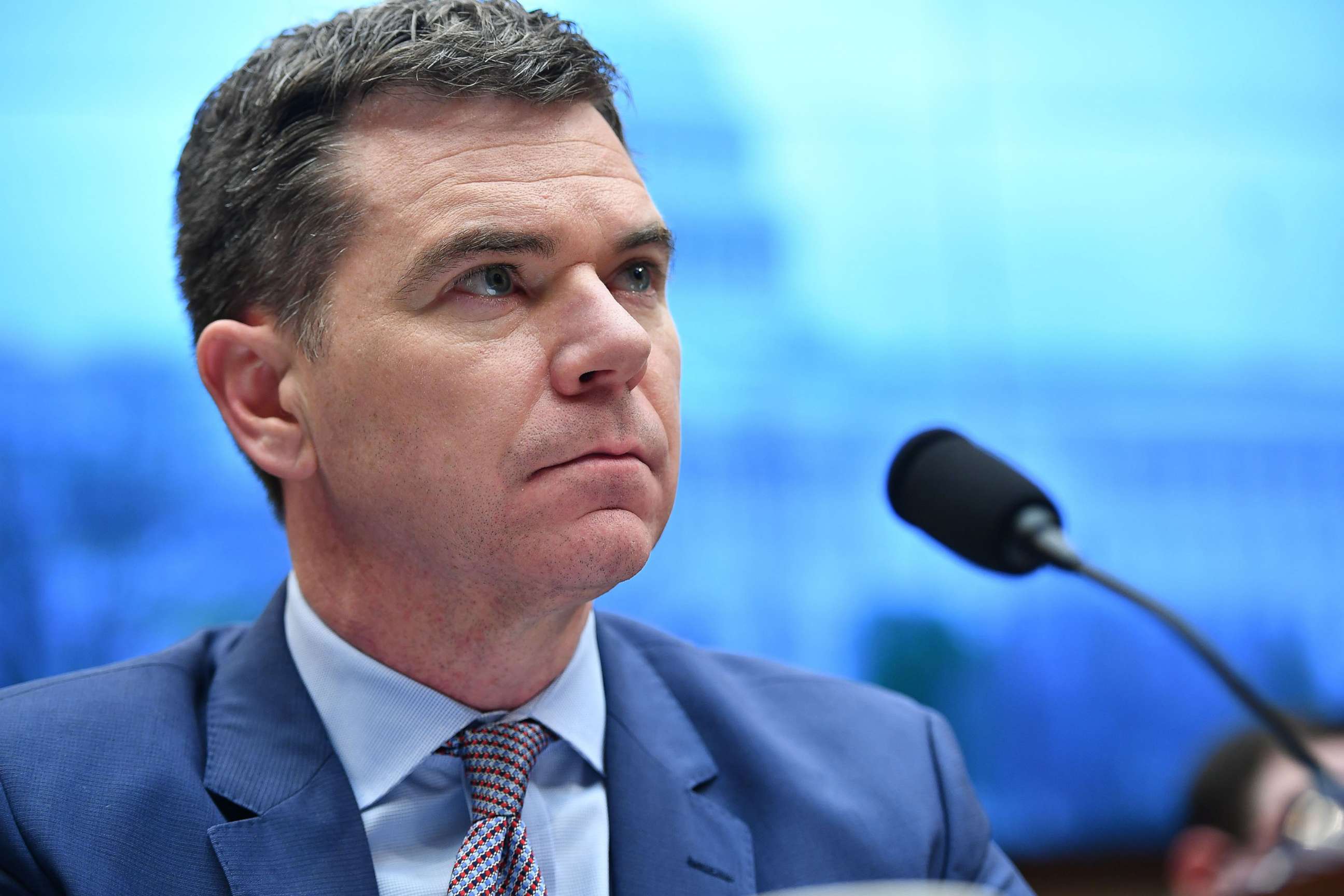
Surveys of teenage vape users show that Juul is overwhelmingly the most popular device, but advocates are increasingly raising concerns that the federal ban on some flavored products doesn't include others like disposable cigarettes or liquids used in refillable devices.
Meredith Berkman of the advocacy group Parents Against Vaping E-cigarettes said her group of concerned parents was completely surprised to see a footnote in the Food and Drug Administration's enforcement plan, specifying that disposable e-cigarettes, which are thrown away after one use, would not specifically be included in the federal ban on flavored vaping products that use replaceable cartridges, as first reported by The New York Times.
Berkman said advocates have pressed the FDA to include all flavored products in the ban, including the disposable e-cigarettes, and that they've pressed lawmakers to question the companies about the other products in Wednesday's hearing.
"It's all part of the same thing," she said, adding, "I hope their feet are held to the fire."
The federal government hasn't published data on the number of middle and high school students who report using disposable e-cigarettes, though it is part of the National Youth Tobacco Survey.
Though the tobacco age across the U.S. was recently raised to 21.
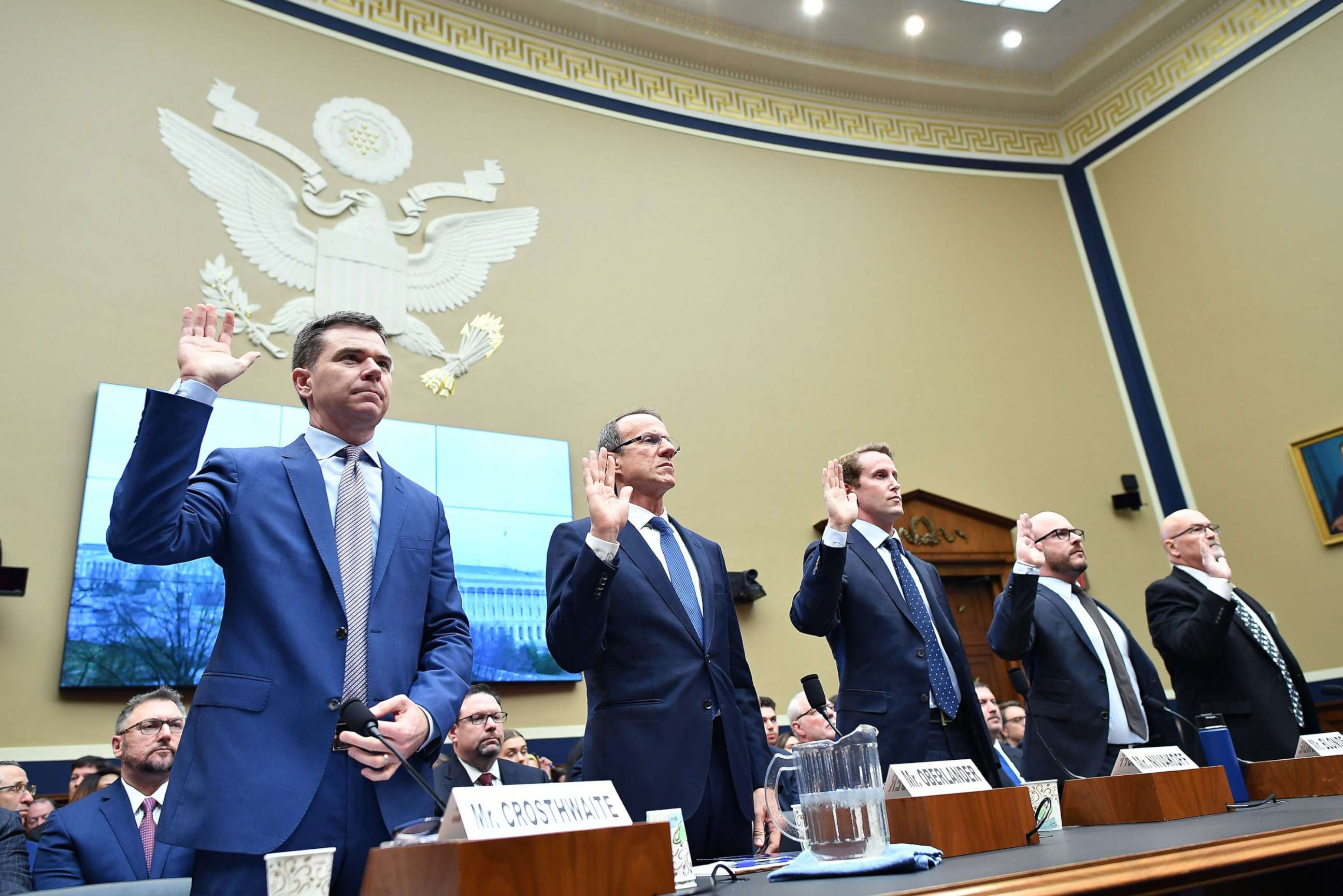
However, Stanford University pediatrics professor Bonnie Halpern-Felsher said teachers and students in the schools she works with report more teenagers are using the cheaper, single-use products.
"Overwhelmingly in the last six months, what we hear is Juul, yes, but really it's these disposables, and they don't even say disposables, these educators and the students will say Puff Bar," she told ABC News, adding "and that is what we're hearing that is going on right now."
Halpern-Felsher said it's difficult to know if the administration's flavor ban prompted teenagers to switch to the disposable products, but that the flavors and high nicotine concentration can still attract younger users.
"We know that youth are using these products in record numbers, and the products that I have in my hand right now I'm looking at this, you know, green lush ice and this peach, beautiful peach colors and flavors and these blue ice, blueberry ice and, you know, things like that," she said. "I've got a rainbow of colors in front of me, that was just given to me and these have a tremendous amount of nicotine in them too."
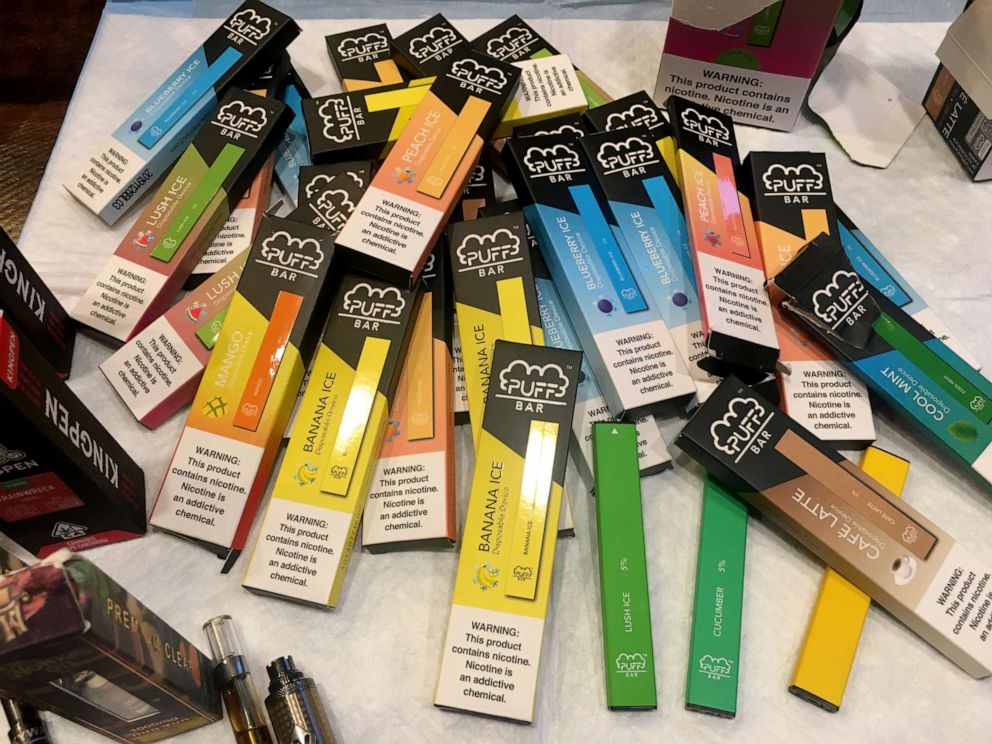
NJOY CEO Ryan Nivakoff and the president of Fontem U.S. Antoine Blonde said they have no data that would indicate their flavored disposable products are being used by large numbers of young people.
NJOY, which manufactures a disposable e-cigarette product, decided to voluntarily stop sales of its fruit flavors amid concerns that teenagers would use them as a replacement for Juul and other cartridge flavors impacted by the ban.
"A week ago we made the decision to voluntarily remove our flavored products, our flavored disposable products, from stores albeit not because those products have created increased access to youth use, we did so because we felt it was consistent with the spirit of the FDA guidance that the large businesses use the PMTA process to adjudicate whether or not flavors are appropriate for the protection of public health," Nivakoff said.
Fontem also sells a disposable, flavored e-cigarette, but Blonde said their disposable product is mostly used by older consumers.
"We are not aware of any current issue caused by our disposable flavored and the fact that the FDA excluded the disposables from the guidance completely -- which we will comply with -- but we do have 9 million adult vapers in the U.S., more or less, adult smokers, that are currently using our products which look like a cigarette,” he said.
Under its new enforcement plan, The FDA said it has the ability to target any e-cigarette company or product targeting young people, even though the definition of e-cigarette in the document specifically excludes disposable, single-use products.
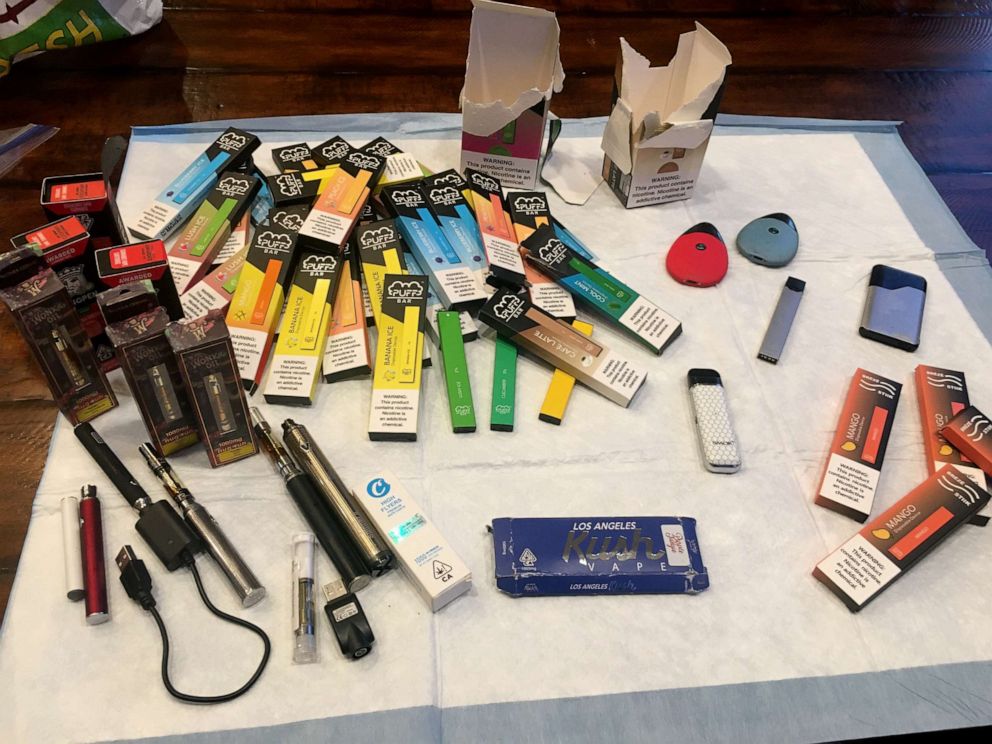
"Let us be clear: Under this policy, if we see a product that is targeted to kids, we will take action," Mitch Zeller, director of FDA's Center for Tobacco Products said in a statement.
"We will continue to use our regulatory authority to tackle this alarming crisis that’s affecting children, families, schools and communities," Zeller said. "We will also continue to closely monitor data regarding youth usage of all e-cigarette products and adjust our enforcement priorities to address youth use as necessary."
Lawmakers on Wednesday also pressed the CEOs on research showing nicotine is addictive, causes health issues in the respiratory system and higher blood pressure, and that e-cigarette products can contain small particles, heavy metals and chemicals that are harmful to the lungs.
Some of the executives said they weren't familiar with the specific studies being referenced but that the company's own research on health risks from their products will be included in applications for FDA approval due later this year.
Juul too voluntarily pulled its sweet flavors from the market last year and later stopped selling and distributing mint after data showed its popularity among young people.
The company also stopped advertising on social media after investigations from the FDA and Congress focused on marketing strategies they said targeted the youth.
Rep. Diana DeGette told reporters after the hearing she thinks all flavored, disposable e-cigarette products should be banned.
She said she and Rep. Brett Guthrie, R-Ky., hope to meet soon with FDA Commissioner Stephen Hahn about the issue.




